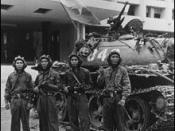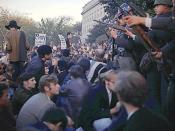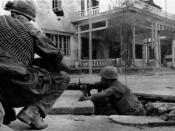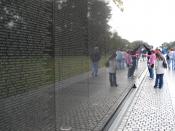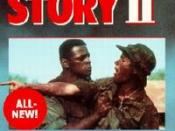There are many war stories written by many war veterans but The Things They Carried by Tim O'Brien stands out from rest. Tim O'Brien communicates that the Vietnam War was about more than just battles. One story in particular, "Sweetheart of the Song Tra Bong," captures this idea. In this story, Rat Kiley tells of the story of a soldier who brought his elementary school sweetheart out to Vietnam, but she fell in love with Vietnam, embraced it, and eventually disappeared into the jungle to gain a connection the men found incomprehensible. This story emphasizes the vast difference between the world of Vietnam and the world back home where it was safe. At the same time as the theme of war changing people, it reiterates the themes of the need of women as an escape from reality and the loss of innocence due to the war. Tim O'Brien examines and depicts the "other" side of war that was deeper and more meaningful through the repetition of themes in his stories.
War changes people, but its effects are different from person to person. Some are driven to insanity and some to nostalgia for the war, some for the better but most for the worse. In ÃÂSweetheart of the Song Tra Bong,ÃÂ Mary Anne came to Vietnam a sweet and innocent girl fresh out of high school, but the allure of the war transformed her. She never went back. Rat describes her change when he says, ÃÂIt took a few seconds... to appreciate the full change. In part it was her eyes; utterly flat and indifferent. There was no emotion in her stare, no sense of the person behind itÃÂ (110). Rat Kiley himself is affected by the war, as illustrated in "Night Life" when he couldn't take the tensions of the war so he scratched himself raw from the bites of huge imaginary bugs and shot his own toe off to get sent to Japan and out of the action. Before Rat Kiley's escape, O'Brien commented, "It was a sad thing to watch. Definitely not the old Rat Kiley. His whole personality seemed out of kilter" (222), and "Rat Kiley finally hit a wall" (222). Norman Bowker, a fellow soldier of Rat Kiley in Alpha Company, also felt the effects of the war, but his breakdown occurred in post-war times as shown in "Speaking of Courage." There was no smooth transition between war and peace for him. He couldnÃÂt fit into and couldn't enjoy home life because it wasn't real enough and the costs weren't high enough compared to war. Norman Bowker wrote to Tim, "[T]here's no place to go. Not just in this lousy little town. In general. My life, I mean. It's almost like I got killed over in Nam" (156). After letting O'Brien know his thoughts, the disquieted Norman Bowker committed suicide. The Vietnam War was too imposing and too overwhelming a time in any person's life for him to remain unaffected by it. A metamorphosis, whether big or small, must occur.
Another motif in "Sweetheart of the Song Tra Bong" is the purpose of women as an escape from reality. Mark Fossie, a medic in the Vietnam War, brought his sweetheart, Mary Anne Bell out to Vietnam. Before the war, "[t]hey were very much in love, full of dreams, and in the ordinary flow of their lives the whole scenario might well have come true" (94) and Mark Fossie wanted to keep Mary Anne and their future dreams to keep him company. She was also a small escape for the other medics stationed with Mark Fossie, because "in the evenings she liked to dance to music from Rat's portable tape deckÃÂ she was good for morale" (95). Mary Anne didn't serve for much consolation from the war by the end of the story with her absences with the Greenies and eventual disappearance into the woods, but Mark Fossie's original intent was for Mary Anne to divert his thoughts from the war. Many other soldiers also thought of their women back home for comfort. In "The Things They Carried," Lieutenant Jimmy Cross had his unrequited love for Martha to distract him from his duties as lieutenant, and he carried letters that ÃÂwere not love letters, but Lieutenant Cross was hopingÃÂ and would ÃÂspend the last hour of light pretendingÃÂ (1). Henry Dobbins also had a woman, his girlfriend, to comfort him in the form of her pantyhose. ÃÂHe liked putting his nose into the nylon and breathing in the scent of his girlfriendÃÂs body; he liked the memories this inspiredÃÂ (117) and ÃÂ[t]hey kept him safeÃÂ (118). Even after his girlfriend dumped him, he cherished the pantyhose and ÃÂtied them around his neck as a comforterÃÂ (118). Another example of this theme is in the story, ÃÂIn the Field,ÃÂ a young unnamed soldier clung to his attachment to a girl back in the US and risked his life to retrieve the only connection he had with her. When Lt. Cross asked him why he was desperately searching through the mud, he replied, ÃÂBillieÃÂs picture. I had it all wrapped upÃÂ and when Lt. Cross said she would send him another picture if he asked, the young soldier said, ÃÂShe wonÃÂt send another one. SheÃÂs not even my girl anymore, she wonÃÂt...ÃÂ (172). Mark Fossie, Lieutenant Jimmy Cross, Henry Dobbins, and the young unnamed soldier all hung onto any scrap of the life back home through their connections with women to get away from the conflict, away from Vietnam, and away from the war.
Not only does war change people and forge the need for an escape from reality, it strips whatever innocence is left in a person. In "Sweetheart of the Song Tra Bong," Tim O'Brien expresses this loss when Rat says ÃÂYou come over clean and you get dirty and then afterward itÃÂs never the sameà(114). Tim OÃÂBrien also makes use of symbols to represent innocence. In "How to Tell a True War Story" after Rat KileyÃÂs friend, Curt Lemon, died in an explosion, he had an emotional breakdown. The company had found a baby buffalo and brought it to camp with them. Rat Kiley was caring towards it at first, offering food and petting it, but turned on it to rid himself of his pain. He shot it in multiple places, but cried the entire time. The buffalo was only a baby, the picture of naïveté, but it was killed because of soldiers, because of war, despite the kindness we should show for the young. The war has a habit of killing baby animals. An orphan puppy was adopted by Ted Lavender who lovingly cared for it ÃÂuntil the day Azar strapped it to a Claymore antipersonnel mine and squeezed the firing deviceà(36). Mary Anne, the baby buffalo, and the puppyÃÂs stories were Tim OÃÂBrienÃÂs representations of the sadness war creates in the loss of the innocent.
ÃÂSweetheart of the Song Tra BongÃÂ is a central story in The Things They Carried. It illustrated several of the many meaningful themes OÃÂBrien tried to convey including the imprint of war on people, the need for actual women and those in spirit to soothe men, and the destruction of innocence. Other war books describe the warÃÂs horrors, but thatÃÂs not what war is about. Even though it had all the trappings of a typical war story on the surface, the depth of the stories Tim OÃÂBrien writes is intense. As Tim OÃÂBrien said, ÃÂIt wasnÃÂt a war story. It was a love story.ÃÂO'Brien, Tim. "The Things They Carried." New York: Bantam Dell, 1999.
